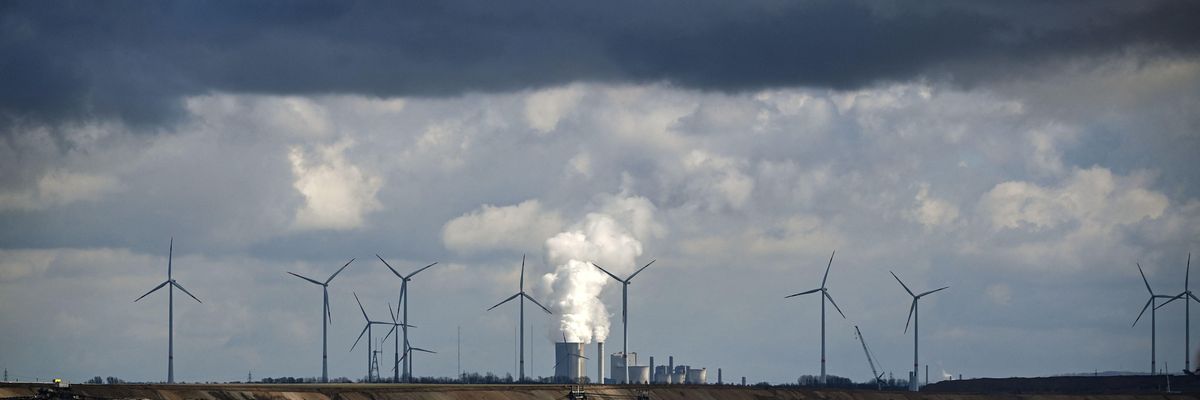Scientists have warned repeatedly that avoiding the most catastrophic consequences of the climate crisis requires a rapid and just transition away from fossil fuels, and yet the largest 25 European banks--all purportedly committed to "net-zero" goals--have provided more than $400 billion in financing to 50 corporations expanding oil and gas production since 2016, with no signs of slowing down.
That's according to a new analysis out Monday from the responsible investment organization ShareAction, which said that this "continued love affair with oil and gas... is not only bad news for the climate, but also presents a huge risk for banks and their investors."
Last year, the International Energy Agency (IEA)--a powerful and relatively conservative institution--stated that there is "no need for investment in new fossil fuel supply" in its Net-Zero Emissions by 2050 pathway, and reiterated in its most recent World Energy Outlook that coal, oil, and gas must stay in the ground to have a fighting chance of limiting global warming to 1.5degC above preindustrial levels by the end of the century.
Despite this unambiguous message from the world's leading energy authority, ShareAction's research shows that Europe's biggest banks are still pumping billions of dollars into more than four dozen oil and gas companies expanding production, including ExxonMobil, Saudi Aramco, Shell, and BP.
Led by top offenders HSBC ($59 billion), Barclays ($48 billion), and BNP Paribas ($46 billion), 25 European banks have financed "upstream oil and gas expanders" to the tune of more than $400 billion since 2016.
Given that the IEA's net-zero roadmap "makes unrealistic assumptions about the prospects of carbon, capture, and storage (CCS) technologies" and "only gives us a 50% chance of keeping warming to 1.5degC," ShareAction said that the energy body's 2021 call to halt new oil and gas investment should be "a minimum level of ambition for banks."
Nevertheless, with oil and gas companies expected to invest $150 billion in new projects in 2022, European financial institutions are doing next to nothing to prevent that from happening. Last year, for instance, Credit Suisse, ING, Intesa Sanpaolo, UBS, Nordea, and Danske Bank increased their fossil fuel funding.
Achieving a net-zero energy system by mid-century is incompatible with "funding an expansion in [the] production of fossil fuels," Mark Campanale, founder and executive chair of Carbon Tracker, said Monday in a statement praising ShareAction's report. "Now is the time for banks to get real with the science, and announce a science-based moratorium on funding new fossil fuel projects."
In addition to flouting scientific guidance, Europe's top banks are also acting in violation of their own public commitments to net-zero. Twenty-four of the banks under scrutiny are members of the United Nations-convened Net-Zero Banking Alliance (NZBA). The lone exception is DZ Bank, which is a member of the Net-Zero Banking Alliance Germany.
Since joining the NZBA last year, these 24 banks have provided at least $38 billion in financing to corporations that are ramping up drilling operations, with about half of the planned projects expected to rely on fracking and other especially destructive methods. Roughly half of that funding ($19 billion) has come from four of the NZBA's founding members--HSBC, Barclays, BNP Paribas, and Deutsche Bank.
While NZBA members have pledged to set emission reductions targets for their energy portfolios, the alliance has been silent on the question of fossil fuel expansion.
Xavier Lerin, senior research manager at ShareAction and lead author of the report, said in a statement that financing further extraction is a "lose-lose bet."
"If oil and gas demand decreases in line with 1.5degC scenarios, prices will fall and assets will become stranded," said Lerin. "On the other hand, if demand does not fall enough to limit global warming to 1.5degC, the economy will suffer from severe physical climate impacts. Either way, value will be destroyed for energy companies, banks, and their investors."
According to ShareAction, just a handful of banks restrict financing for fossil fuel projects, and even fewer have taken steps to limit financing for corporations that are expanding oil and gas production.
Of the 25 banks analyzed, only Commerzbank, Credit Mutuel, Danske Bank, La Banque Postale, and NatWest have started curbing financing for oil and gas projects. But only Commerzbank, Credit Mutuel, and La Banque Postale have also committed to reducing financing for companies with oil and expansion plans, and that applies strictly to new clients in the case of Commerzbank.
ShareAction called this "an important distinction" because "some 92% of finance to oil and gas companies comes from general-purpose corporate loans. These can be directed into any subsidiary or project the company likes."
"Banks often frame their objectives in terms of supporting clients to transition away from fossil fuels, rather than imposing financing restrictions," ShareAction noted. "But most banks--HSBC included--are not demanding transition plans from clients, raising doubts about their commitment to this transition."
According to the report, Danske Bank and NatWest are the only banks that have publicly urged some of their oil and gas clients to establish transition plans by a set date. Meanwhile, La Banque Postale is the only bank mandating that clients eliminate oil and gas expansion plans.
ShareAction is calling on asset managers to take advantage of their shareholder rights to demand investment policies that stop bankrolling planetary destruction.
"Last year shareholders were instrumental in pushing banks to adopt or strengthen restrictions on coal finance," said Kelly Shields, senior officer for banking standards at ShareAction. "This year they need to replicate that success with oil and gas expansion by voting for robust shareholder resolutions and against inadequate say on climate plans."

